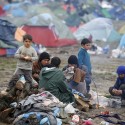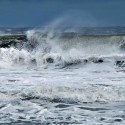Tag: Turkey
-
Pazarkule: Bir ayın sonunda / After a month
Once drawn to the Turkey-Greece border, migrants are trapped by the police force, with hunger and miserable conditions, and pushed back several times.
-
Turkey: State paramilitaries are destroying Syrian refugees’ tent homes in İzmir
As of February 8th, refugees living in tents in the Torbalı and Bayındır districts of İzmir are being evacuated in accordance with district governorate decisions through the intervention of its gendarmerie State paramilitary force. The tent areas are being removed. Thousands of refugees, who left their countries because of the civil war in Syria, have…
-
Solidarity with daily Özgür Gündem and its detained or harassed journalists
Solidarity with daily Özgür Gündem and its detained or harassed journalistsSolidarity also with Ragip Zarakolu, Asli Erdogan, Eren Keskin and Filiz KoçaliDaily Özgür Gündem, which has been shut down by court order, has been released as a special four-page edition carrying the headline “We will not give in”. The daily, published in solidarity, appeared in…
-
Syrian Gay Refugee Killed in İstanbul
Syrian gay refugee Muhammed Wisam Sankari has been found dead in Yenikapı district of İstanbul. Perpetrators of Sankari who was beheaded are yet to be caught. Sankari who was threatened, kidnapped by a crowded group of men and raped earlier was trying to flee to another country for his life safety. In the wake of…
-
Demo 15.04. // Stop deportations – There is enough space for everyone! // Alexanderplatz
*Arabic ** English below *** Francais en bas Stop deportations – There is enough space for everyone! Aufruf zur Demo am Freitag den 15.04.2016 um 16Uhr am Alexanderplatz gegen die Abschiebungen in die Türkei und für die Aufnahme von Geflüchteten. Seit Montag werden Flüchtende von Griechenland in die Türkei abgeschoben. In die Türkei, in der gerade…
-

European borders update, 11.3.2016
By Are you Syrious?, 11.3.2016 #LEBANON: At the present, the long term international volunteers in Lebanon are coordinating centrally around a Lebanese NGO called Salam LADC (Lebanese Association for Development and Communication). Salam has strong ties with the local authorities responsible for refugees, the UNHCR, the Lebanese Military (essential permissions for visiting and distributing at…
-
Solidarität mit dem kurdischen Freiheitskampf!
english below Solidarität mit dem kurdischen Freiheitskampf! Die kurdische Freiheitsbewegung hat seit 2013 einen ernsthaften Friedensdialog mit dem türkischen Staat begonnen. Direkte Gespräche zwischen Abdullah Öcalan und hohen türkischen Staatsvertreter_innen, einseitige Waffenstillstände der Guerilla, der Aufbau basisdemokratischer Selbstverwaltungsstrukturen in der Osttürkei und die parlamentarische Demokratieoffensive der HDP waren die wichtigsten Maßnahmen für eine Lösung der…
-
EU paktiert mit der Türkei für Krieg, Ausbeutung und Kontrolle auf Kosten der Geflüchteten
Oktober 2015: Wenige Tage vor den kritischen Wahlen in der Türkei hatte sich die Bundeskanzlerin Angela Merkel mit dem türkischen Ministerpräsidenten Erdoğan getroffen. Im Hinblick auf den innerstaatlichen Konflikt, durch den die politische Landschaft des Landes geprägt ist, war der Zeitpunkt des Treffens eine eklatante Unterstützung der Regierung von Erdoğan für die bevorstehenden Wahlen. Während…
-

European bordezones update
Important: #WeatherAegean: United Rescue issues an IMPORTANT warning for the Aegean Sea: A huge storm is expected Saturday the 16th of January and Sunday the 17th of January which will be a thunderstorm on some of the islands accompanied by high waves. Also, snow is expected to fall on some of the islands in the…